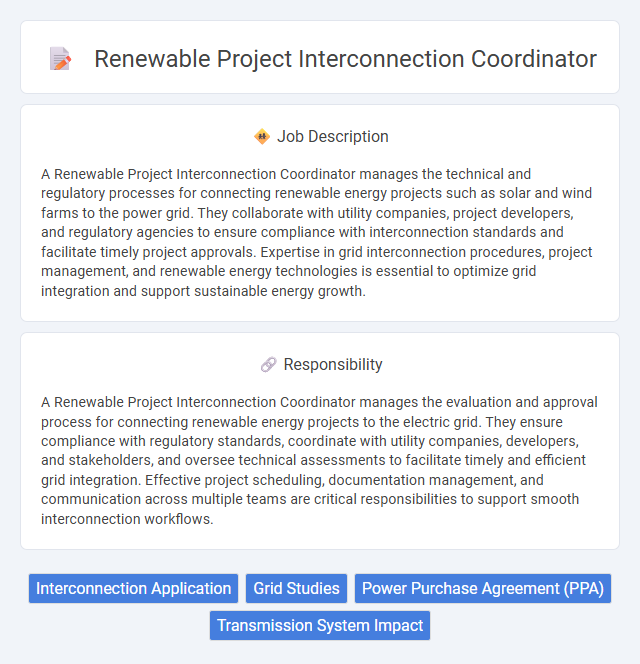
A Renewable Project Interconnection Coordinator manages the technical and regulatory processes for connecting renewable energy projects such as solar and wind farms to the power grid. They collaborate with utility companies, project developers, and regulatory agencies to ensure compliance with interconnection standards and facilitate timely project approvals. Expertise in grid interconnection procedures, project management, and renewable energy technologies is essential to optimize grid integration and support sustainable energy growth.
Individuals with strong communication skills and an aptitude for technical coordination are likely well-suited for a Renewable Project Interconnection Coordinator role, as the position may require frequent interaction with engineers, developers, and regulatory bodies. Candidates who can manage complex schedules and troubleshoot logistical challenges under pressure have a higher probability of thriving in this dynamic environment. Those who prefer routine tasks over adaptive problem-solving might find the job less fitting for their strengths.
Qualification
A Renewable Project Interconnection Coordinator requires a strong background in electrical engineering or energy systems, often supported by a bachelor's degree in a related field. Proficiency in grid interconnection standards, project management, and experience with regulatory frameworks like FERC or NERC compliance are essential qualifications. Advanced skills in communication, data analysis, and coordination tools enable effective collaboration between renewable energy developers and utility providers.
Responsibility
A Renewable Project Interconnection Coordinator manages the evaluation and approval process for connecting renewable energy projects to the electric grid. They ensure compliance with regulatory standards, coordinate with utility companies, developers, and stakeholders, and oversee technical assessments to facilitate timely and efficient grid integration. Effective project scheduling, documentation management, and communication across multiple teams are critical responsibilities to support smooth interconnection workflows.
Benefit
Renewable project interconnection coordinators likely enhance grid integration efficiency by streamlining the approval and connection processes for renewable energy projects. Their role probably reduces project delays and costs, increasing the feasibility and attractiveness of clean energy investments. This coordination may also support grid stability and promote sustainable energy growth, benefiting both utilities and consumers.
Challenge
The Renewable Project Interconnection Coordinator role likely involves navigating complex regulatory environments and managing technical requirements to ensure timely grid connections. Challenges may arise from coordinating between multiple stakeholders with differing priorities, such as utility companies, regulators, and project developers. Balancing these demands while maintaining compliance and minimizing delays could require strong problem-solving skills and adaptability.
Career Advancement
Renewable Project Interconnection Coordinators play a crucial role in facilitating the integration of renewable energy sources into the power grid, ensuring compliance with regulatory standards and optimizing project timelines. Career advancement opportunities in this field include progressing to senior interconnection coordinator roles, project management, and regulatory compliance leadership within utility companies or energy firms. Gaining expertise in grid operations, power systems, and renewable energy technologies enhances prospects for higher-level positions and specialized roles in energy transition initiatives.
Key Terms
Interconnection Application
The Renewable Project Interconnection Coordinator manages the interconnection application process, ensuring timely submission and compliance with regulatory requirements for renewable energy projects. They facilitate communication between project developers, utility companies, and grid operators to streamline grid connection approvals. Expertise in grid interconnection standards and project timelines is essential for optimizing renewable energy integration.
Grid Studies
A Renewable Project Interconnection Coordinator specializes in conducting detailed grid studies to evaluate the impact of renewable energy projects on electrical systems. These studies assess load flow, stability, and short-circuit scenarios to ensure safe and reliable integration of solar, wind, and other renewable sources into the grid. Expert analysis facilitates compliance with regulatory standards and guides infrastructure upgrades necessary for efficient interconnection.
Power Purchase Agreement (PPA)
Renewable project interconnection coordinators specialize in managing the technical and regulatory processes that connect renewable energy projects to the grid, ensuring compliance with Power Purchase Agreement (PPA) terms. They facilitate timely grid interconnection approvals and coordinate with utilities to meet PPA milestones, minimizing delays and financial penalties. Expertise in grid codes, interconnection studies, and PPA contractual obligations is essential for optimizing renewable energy project execution and revenue certainty.
Transmission System Impact
Renewable project interconnection coordinators manage the integration of wind, solar, and other clean energy sources into the electrical grid, focusing on Transmission System Impact studies to evaluate grid reliability and capacity implications. They analyze network constraints, perform load flow and stability assessments, and coordinate with utility operators to ensure seamless interconnection without compromising system stability. Expertise in Federal Energy Regulatory Commission (FERC) standards and North American Electric Reliability Corporation (NERC) guidelines is essential for managing project timelines and mitigating transmission system risks.
 kuljobs.com
kuljobs.com